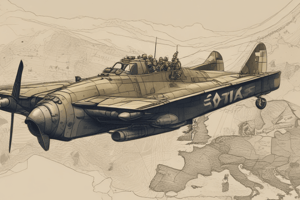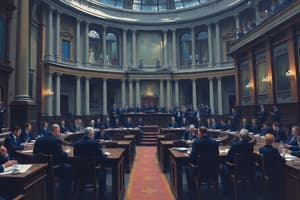Podcast
Questions and Answers
The course will consist of 15 lectures and seminars.
The course will consist of 15 lectures and seminars.
False
One of the goals of the course is to explore the evolution of European ideas about politics and culture.
One of the goals of the course is to explore the evolution of European ideas about politics and culture.
True
The course includes studies on Authoritarianism as a challenge.
The course includes studies on Authoritarianism as a challenge.
True
Aristotle had a favorable view of democracy.
Aristotle had a favorable view of democracy.
Signup and view all the answers
The assessment format includes a multiple-choice exam.
The assessment format includes a multiple-choice exam.
Signup and view all the answers
The course reading list includes 'The Shortest History of Europe' by John Hirst.
The course reading list includes 'The Shortest History of Europe' by John Hirst.
Signup and view all the answers
The course will only cover historical events without addressing contemporary political practices.
The course will only cover historical events without addressing contemporary political practices.
Signup and view all the answers
Understanding what constitutes a 'state' is one of the key questions explored in the course.
Understanding what constitutes a 'state' is one of the key questions explored in the course.
Signup and view all the answers
The Roman legal system is still influential in many parts of the world today.
The Roman legal system is still influential in many parts of the world today.
Signup and view all the answers
Status and power in Roman culture were solely determined by race and language.
Status and power in Roman culture were solely determined by race and language.
Signup and view all the answers
The concept of 'paideia' included proficiency in reading, writing, and especially speaking Latin.
The concept of 'paideia' included proficiency in reading, writing, and especially speaking Latin.
Signup and view all the answers
Roman communication networks were advanced for their time and contributed to a transnational educated elite.
Roman communication networks were advanced for their time and contributed to a transnational educated elite.
Signup and view all the answers
The term 'Lingua franca' refers to the specific language used only by the ruling class in Rome.
The term 'Lingua franca' refers to the specific language used only by the ruling class in Rome.
Signup and view all the answers
Politics is solely concerned with the economic aspects of society.
Politics is solely concerned with the economic aspects of society.
Signup and view all the answers
Individualism and a critical spirit are considered core European values.
Individualism and a critical spirit are considered core European values.
Signup and view all the answers
Culture is defined solely by material objects.
Culture is defined solely by material objects.
Signup and view all the answers
The concept of identity includes values, beliefs, and ideas.
The concept of identity includes values, beliefs, and ideas.
Signup and view all the answers
The struggle for power is not a significant aspect of politics.
The struggle for power is not a significant aspect of politics.
Signup and view all the answers
Culture is a shared experience among members of a society.
Culture is a shared experience among members of a society.
Signup and view all the answers
Political parties have no role in representing diverse interests in society.
Political parties have no role in representing diverse interests in society.
Signup and view all the answers
The public sphere is irrelevant in understanding politics.
The public sphere is irrelevant in understanding politics.
Signup and view all the answers
The term 'Europe' was coined by the Romans.
The term 'Europe' was coined by the Romans.
Signup and view all the answers
Alexander the Great was educated by Socrates.
Alexander the Great was educated by Socrates.
Signup and view all the answers
Hellenistic civilization was a mix of Greek culture and local traditions.
Hellenistic civilization was a mix of Greek culture and local traditions.
Signup and view all the answers
The concept of a 'citizen' in ancient Greece was associated with strong state power.
The concept of a 'citizen' in ancient Greece was associated with strong state power.
Signup and view all the answers
Rome's expansion was primarily driven by its military power.
Rome's expansion was primarily driven by its military power.
Signup and view all the answers
The local elites in conquered areas often lost all their power under Roman rule.
The local elites in conquered areas often lost all their power under Roman rule.
Signup and view all the answers
The Pax Romana refers to the period of peace and stability across the Roman Empire.
The Pax Romana refers to the period of peace and stability across the Roman Empire.
Signup and view all the answers
Greek culture had no influence on Roman values.
Greek culture had no influence on Roman values.
Signup and view all the answers
Urban elites in Greek culture were known as cosmopolitan citizens of the world.
Urban elites in Greek culture were known as cosmopolitan citizens of the world.
Signup and view all the answers
Romanization included the construction of roads to link territories.
Romanization included the construction of roads to link territories.
Signup and view all the answers
Study Notes
Course Introduction
- The lecture series explores political challenges in Europe.
- The course will cover the logistics, key terms, and the Greco-Roman world.
- The course will comprise 13 lectures and 13 seminars.
- Students are expected to read and watch weekly materials.
- The required texts are: John Hirst's The Shortest History of Europe and Robert Garner, Peter Ferdinand and Stephanie Lawson's Introduction to Politics (5th edition)
Key Questions to Ask
- What constitutes a European?
- What is power?
- How did the Christian Church become so influential in Europe?
- Why do people obey their leaders?
- What is freedom?
- What makes a democracy a democracy?
- Why are some places recognized as states, while others are not?
- Why is there a resurgence of authoritarianism?
- Why are branches of government separated?
- How did ideologies develop?
- Why are there different political, electoral and party systems?
- What is the role of the people in politics?
Course Objectives
- Understand the evolution of European ideas about politics and culture, and the EU's values
- Understand contemporary European political challenges
- Learn about contemporary European practices and institutions
- Define European unity and diversity relative to other cultures
Course Assessment
- An open-ended exam, covering all 13 lectures.
- The exam will comprise 10 questions.
- Each question will relate to different lectures.
Topics
- The Challenge of Religion (lectures 1, 2, 3 on European history)
- The Challenge of Sovereignty (lecture 4 on the European nation state)
- The Challenge of Checking Power 1 (lecture 5 on the History of Democracy)
- The Challenge of Checking Power 2 (lecture 6 on the Functioning of Democracy)
- The Challenge of Unchecked Power (lecture 7 on Authoritarianism)
- Checked Power in Practice (lecture 8 on the Branches of Government)
- The Challenge of Accurate Representation (lectures 9 and 10 on Ideologies)
- The Challenge of Accurate Representation (lecture 11 on Political Parties)
- The Challenge of Fair Representation (lecture 12 on Elections)
- The Challenge of Freedom beyond the State (lecture 13 on Civil Society)
What is Europe?
- Three perspectives: Politics, Culture, and Business.
- The focus is on politics and cultural values as factors for understanding European identity.
What is Identity?
- Identity is an image or understanding of oneself.
- Identities are often attributed through social categories.
- Personal identities are unique and separate from those of others.
- Values are what is held to be important.
What is Culture?
- Culture encapsulates the way of thinking, acting, and interacting within a society.
- It also includes material objects, ideas, values, attitudes, and behaviour patterns.
- Cultures are shared by members of a community.
What is Politics?
- Politics is about the public sphere of the state, which involves struggle for power and leadership.
- Politics involves making decisions about society.
- This also involves conflict and cooperation, reconciling varying views and interests in a given society.
- It also includes the pursuit and exercise of power.
What Makes Us Europeans?
- Europeans are identified by a blend of identity, values, culture, and practices.
- Shared values include respect for human dignity, freedom, democracy, equality, rule of law, and human rights.
- Shared values are common among member states but also account for differences based on pluralism, tolerance, justice, equality, and non-discrimination.
Core European Values
- Individualism
- Human rights
- Democracy
- Rule of Law
- Secularity and rationality
- Humanistic thinking
Journey Through Time
- The course traces the history, commerce, infrastructure, temples and performance of European values through time.
- From ancient Greece to the Roman Empire and further on.
Solutions to Challenges
- This section considers how to address modern challenges involving representation, sovereignty, and authoritarianism.
"Why Should You Care?"
- Students should care about the course to understand their identities, how to be a qualified and competent professional that understands international and intercultural aspects.
What is Europe (geographical)?
- This focuses on the geographic borders/boundaries and its relationship to surrounding continents.
The Term "Europe"
- The term was coined by Greeks, originally referring to a mythical maiden.
- Contrast Greeks and non-Greeks, with a focus on the Greek sphere of influence.
Greco-Roman/Roman Empire
- The Roman Empire expanded on, and developed Greek values and institutions.
- The Roman Empire was an expansionist military power
- The process of Romanization involved expanding power and establishing internal and external challenges.
- It involved constructing infrastructure—roads, temples, aqueducts, baths, and amphitheaters.
- The Roman Empire developed a legal heritage that still impacts modern Europe.
- The Roman Empire fostered a transnational educated elite.
- Roman law and the concept of "paideia" played a role in cultural and political development.
Roman Legal Heritage
- Roman jurists developed sophisticated legal codes, which provide a foundation for legal systems in many parts of Europe and the world.
- Key concepts include "benefit of the doubt" and the dominance of "spirit of the law over letter of the law.”
- Roman law profoundly shaped Europe's legal system.
Roman Culture
- Status and power were tied to wealth, prestige, and adapting to the elite culture.
- Citizens across all free men had equal rights in the Empire.
- The emphasis on paideia emphasized the power of education.
Roman Strengths
- The creation of a transnational network, establishing shared language, and open cultural values.
Readings for the Week
- Students must read parts of Robert Garner, Peter Ferdinand and Stephanie Lawson's 5th edition introduction, including "what is politics?", "is politics inevitable?", "political questions", and a section on the boundaries of politics.
- Students will also watch two parts of The Story of Europe video series.
Seminar Preparation
- Students need to prepare for seminars by familiarising themselves with important concepts like identity, Culture, Politics, Polis, Cosmopolitan, Greco-Roman civilization and Paideia.
Studying That Suits You
Use AI to generate personalized quizzes and flashcards to suit your learning preferences.
Related Documents
Description
This course introduction explores the political challenges faced in Europe, covering logistics, key terms, and historical contexts from the Greco-Roman world. Students are encouraged to engage with weekly materials and key texts to better understand European identity, power dynamics, and the role of democracy. Prepare to delve into thought-provoking questions regarding governance and political systems.


